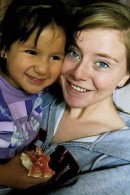By Briana Flynn
VE Volunteer from Massachusetts, USA
Almost seven months ago I landed in the Santiago airport and the reigning emotion was panic. I didn’t know my address in Chile for the immigration papers. That, and I was about to become a daily fixture in the lives of 30 girls, some my own age, none of whom spoke my language, all with histories of sexual abuse, domestic violence, neglect, and poverty.
Last night I sat cozy in a bunk bed with two little girls in nightgowns and their elephant puppets. One of the girls played with my hair, the other rested her head on my lap. One silly comment led to another and soon we weren’t in the hogar but in a fantasyland that starred their elefantitos. We took turns story-telling so that the plot was a series of wild twists. Giggles took over, that level of giggles only achievable by overtired 8 year olds. Eventually the laughter lost to heavy eyelids, and the girls were fast asleep, their little limbs fastened around me.
During September and October the initial panic subsided, giving way to other emotions. All were equally as electric and consuming. I felt frustration at my impression of the hogar’s attitude towards the girls’ struggles in school and their passivity in preparing the older girls for the day when they’d need to find their own footing outside the hogar. I felt utter helplessness at the lack of prospects for the girls’ futures. These feelings were underlain by a deep guilt in the injustice that I’ve never need doubt my security, that next year I’ll go to college, and that I have the unconditional love and support of a stable family.
I was turning over questions I couldn’t answer: How do I console a three year old crying out for the mommy she hasn’t seen in months? How do I talk to a five year old who just woke up from a nightmare of flashbacks to dark scenes from her past? How do I show these teenagers that getting pregnant need not be their path to fulfillment, when higher education isn’t a feasible option? And even if I read every story in the world to this 10 year old, will she ever be able to identify letters, read on her own, graduate high school, or manage a sustainable lifestyle? Or will she meet this society’s expectations and end up like her mom, on the street, reliant on drugs?
Though weeks and months have gone by, I haven’t resolved much with respect to these jumbly questions. Instead, an additional gut-wrenching question has begun to challenge me: No matter how much I love these girls, and no matter how much they love me, is any amount of love enough to help them sort out the cards they’ve been dealt? Can emotional support alone make change, or are there overriding problems here only reparable by money and physical means that I’m unable to provide?
It’s difficult to feel confident that the girls will benefit long-term from my time with them. Still, sometime between a million temper tantrums and a million and one hugs, I formed some of the most loving, reciprocal relationships of my life.
As leaving becomes a reality, I think about the things I’ll miss most: being spoken to exclusively in Chilean gibberish Monday through Friday; skipping, by mandate, hand in hand, all ten blocks to the psychologist; dancing like goofy goobers in the comedor (dining room) before dinner; sharing my thoughts on the pros and cons of every last box of hair dye at the drugstore; sitting with the older girls in the bed of the infamous flat-tired truck, belting out their favorite English song, I Will Always Love You (more recently with pauses to mourn Whitney’s death). But mostly, I’ll miss hearing about days at school, pololos (boyfriends) and ex-pololos (ex-boyfriends), celebrating the good stuff and figuring out the tough stuff.
At times I had trouble determining my role at the hogar. Since many of the girls are so close to my age, I wasn’t always a caretaker. The girls, with each other, seem to take on all the familial roles that they’re missing. They correct each other, wipe away each other’s tears, and stand up for each other with some fierce loyalty. They are their own moms, dads, and siblings, and together they weave their only accountable safety net. When my family visited in December, one of the girls pressed her cheek up against mine and said to my mom, “Tía Bri is my big sister. Don’t we look alike?” In time, I’ve become no more, but no less, than another member of their alternative family.
So, soon I’ll go home to Dedham, Massachusetts, with a head full of impossible questions about this world we live in, and a heart heavy with concern for what life has in store for my girls. But after seven months, my prevailing feeling is just the opposite of panic. It’s one I never imagined I’d feel thousands of miles from my own family, and it greets me with besitos (kisses) every time I walk into the hogar – the profound comfort of home.


